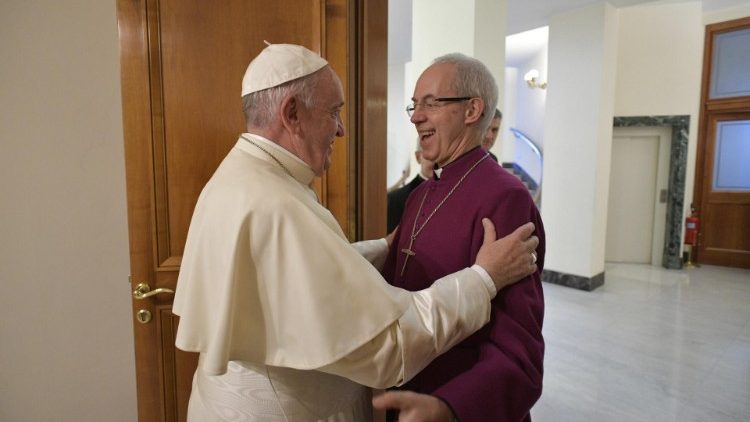Welcoming Vatican and international cardinals and the former Archbishop of Canterbury, the widely-anticipated seminar “The Malines Conversations 100 Years On” will be held on June 11, 2021 at 2:30 p.m.
Co-hosted by the Belgian and British Ambassadors to the Holy See, Patrick Renault and Sally Axworthy, respectively, Exaudi participated in their advance June 8 morning briefing with a few other Vatican journalists ahead of the ecumenical event at the Belgian Ambassador’s Residence in the Parioli quarter of Rome.
Cardinal Kurt Koch, the President of the Pontifical Council for Promoting Christian Unity; Cardinal Josef De Kesel, Archbishop of Mechelen-Brussels, Belgium; His Grace Archbishop Rowan Williams, Welsh Anglican bishop, theologian and poet, who served as Archbishop of Canterbury (2002-2012), will be the panel speakers on Friday, along with other illustrious participants.
“This is a once in a 100 year opportunity for us,” stressed Ambassador Renault this morning, “as it marks exactly a century since this happened.”
Following a resolution of the Lambeth conference in 1920, contacts were made between members of the Anglican Church, including Lord Halifax and the Archbishop of York, and Cardinal Mercier, Archbishop of Malines and Primate of the Catholic Church in Belgium. Between 1921 and 1927 Cardinal Mercier, and his successor, Cardinal van Roey, hosted five private conversations between Anglicans and Catholics on whether the two Churches should be reunited.
The Belgian Ambassador recalled how the “extremely courageous” Cardinal Mercier was a “hero of the resistance” against the Germans, and how his role, along with the other members “was really revolutionary,” “marking a major, major step forward, marking a new era of ecumenism.”
Acknowledging dissenting views which have and continue to surface, especially in Rome and Great Britain, it was recognized: “Not all supported these conversations.”
Regardless, the Ambassadors pointed that still today, clerics on both sides continue talking, and not only, as they actively work together in various projects around the world, such as in hospitals and education. South Sudan, and throughout Africa, this is evident, but numerous countries globally, including Canada, also reflect this cooperation.
Ambassador Axworthy: Religions & Confessions Tackling World Problems Together
Ambassador Axworthy highlighted how Pope Francis’ recent encyclicals Fratelli Tutti and Laudato Si have produced even greater unity ecumenically between the religions.
“The way Fratelli Tutti calls on religions to tackle world problems together, and that Laudato Si expresses the need, understood by many religions, to save and protect the environment,” Ambassador Axworthy suggested, has further brought religions together in recent times.
She also recalled how ahead of the canonization of St. John Henry Newman, the Prince of Wales traveled to Rome and wrote a reflection for the Vatican newspaper L’Osservatore Romano. Despite secularized society prevailing in the UK, the Ambassador expressed various symbols of hope for ecumenical relations growing stronger through working together and dialogue.
“This upcoming event,” the British diplomat expressed, “we hope will spark some thinking.”
Belgian Ambassador Renault: A way to look to the future
“This is not just to commemorate a historical event,” Ambassador Renault told the few journalists present, “but a way to look at the future.”
The Malines conversations resulted in intensification of the Week of Prayer for Christian Unity and ultimately in the visit of the Archbishop of Canterbury, Michael Ramsay, to Pope Paul VI in 1966, and the start of the institutional dialogues, the Anglican Roman Catholic International Commission (ARCIC) in 1970 and the International Anglican-Roman Catholic Commission for Unity and Mission (IARCCUM) in 2001.
The upcoming seminar will consider the conversations’ impact and legacy, and the future of ecumenism. Moreover, it will look at Anglican/Catholic ecumenism beyond its institutional framework, and talk about the path followed by both churches, as well as the way forward. In addition, it will also celebrate the inspired intervention of the Belgian convenors of the dialogues.
A link to participate remotely will be made available in the near future.










